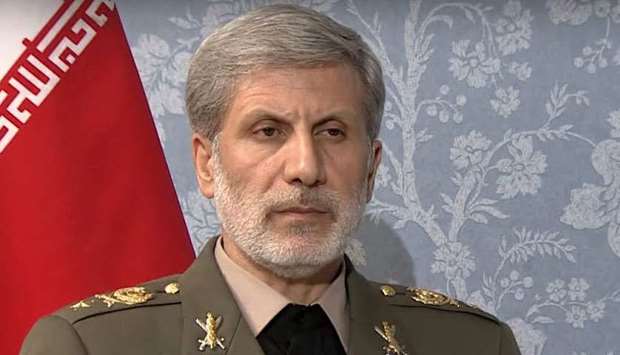Iran's defence minister said on Thursday that the formation of a US-led flotilla in the Gulf would "increase insecurity" and any Israeli involvement would have "disastrous consequences" for the region.
Tehran and Washington have been locked in a battle of nerves since US President Donald Trump withdrew from a landmark 2015 nuclear deal with Iran last year and reimposed sanctions.
Tensions have soared in the region, with drones downed and tankers mysteriously attacked in Gulf waters.
In response, the US has been seeking to form a coalition whose mission-- dubbed Operation Sentinel -- it says is to guarantee freedom of navigation in the Gulf.
Britain, which already has warships on protection duty in the Gulf after a UK-flagged tanker was seized by Iranian Revolutionary Guards, has said it will join the planned operation.
But other European countries have kept out, for fear it might harm European efforts to reach a negotiated settlement with Iran.
"The military coalition that America is seeking to form with the excuse of securing maritime transport will only increase insecurity in the region," Defence Minister Amir Hatami said.
Reacting to reports of Israeli willingness to join the coalition, he said it would be "highly provocative and can have disastrous consequences for the region".
A QNA report from London said British Prime Minister Boris Johnson and Australian Prime Minister Scott Morrison discussed issues related to the security of navigation in the Arabian Gulf on a telephone conversation on Thursday.
A statement issued by the British Prime Minister said the two prime ministers agreed on the importance of concerted international efforts to protect shipping and defend freedom of navigation in the Gulf.
With regard to the tension between Iran and the United States, the statement noted that Johnson expressed Britain's continued commitment to maintain the nuclear agreement with Iran as the best option to prevent Tehran from obtaining a nuclear weapon.
The Strait of Hormuz is considered the world's most important waterway for oil shipments, with Australia reliant on it for some of its oil supply.
********
Macron sending mixed signals, says Trump
Washington, Reuters: US President Donald Trump on Thursday said no one is authorised to speak to Iran on behalf of the United States, and he accused French President Emmanuel Macron of sending "mixed signals" to Tehran over possible talks.
"I know Emmanuel means well, as do all others, but nobody speaks for the United States but the United States itself," Trump said in a series of tweets.
It was not immediately clear what Trump was referring to, but a report earlier this week said Macron had invited Iranian President Hassan Rouhani to this month's G7 summit to meet Trump. A French diplomat denied the report on Wednesday.
Representatives for the White House did not immediately respond to a request for comment on Trump's Iran tweets.
European leaders are seeking to defuse the brewing confrontation between Tehran and Washington after Trump pulled out of the Iran nuclear last year and renewed sanctions in an effort to push a new deal under the US Republican president.

